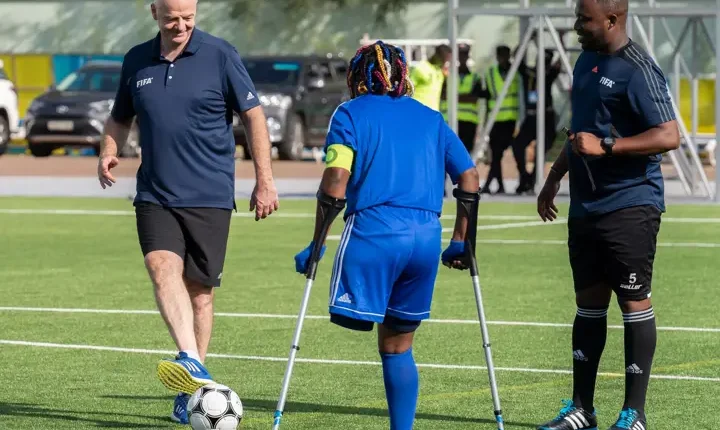
The Albino Foundation Public Notice
FIFA has launches New toolkit designed to support increased participation in disability football.
FIFA stated this on its website INSIDE FIFA.
The statement reads “FIFA is committed to promoting inclusion for all, including disabled people.
The toolkit “aims to build on the work already done by FIFA’s member associations and other stakeholders
One of FIFA’s key missions as world football’s governing body is to promote inclusion for all in the game, including disabled people and people with limited mobility. As part of this commitment, FIFA has published an extensive guide to disability football to encourage and support its growth around the world and to provide more opportunities for people to take part in this form of the beautiful game.
“The FIFA Disability Football Toolkit, compiled by FIFA’s Human Rights and Anti-Discrimination Department, provides an understanding of the basic principles of disability football and the various formats and disciplines that may be implemented by member associations (MAs) and other relevant stakeholders.
““Football unites the world, and FIFA’s role is to be a vehicle for social inclusion and economic development across the planet. This includes the development of all disciplines of disability football,” said FIFA President Gianni Infantino. “Indeed, in many parts of the world, there is still a lack of opportunity for disabled people to play and enjoy football, and this is why FIFA is constantly working to ensure that all disabled people have the opportunity to play football, no matter where they come from or where they live.
“The toolkit aims to support increased participation in disability football through programmes and competitions organised by the confederations, MAs, international disability football federations and other key stakeholders. It also looks to share knowledge, celebrate best practices and accelerate collective action.
“According to the World Health Organization (WHO), 1.3 billion people, or 16% of the world’s population, experience some form of disability, with that number likely to increase. Participation in sport for disabled people is highly beneficial for their physical health and promotes their social inclusion, mental well‑being and personal development. However, they are significantly more likely to be physically inactive compared to non-disabled people. For example, fewer than 20% of people with acquired neurological damage practise the levels of physical activity recommended by WHO and more than 50% of individuals with spinal cord injuries are physically inactive.
“Expanding participation in disability football is crucial for building a more inclusive and equitable sporting culture. It allows people with disabilities to benefit from improved fitness, enhanced mental health and greater social integration. It also helps to break down barriers and challenge stereotypes, contributing to a broader cultural shift towards the acceptance and inclusion of disabled people.
“Around the world, there are various disciplines and formats offering opportunities for disabled people to play football. In countries where disability football is more established, these opportunities have mostly been made available by civil society organisations seeking to include disabled people in football.
“The toolkit consists of three main sections. The first provides guidance on understanding disability; the second focuses on disability football and gives details about the various types, such as cerebral palsy football, blind football and powerchair football; and finally, there is a step-by-step plan on how to grow disability football according to specific circumstances in the relevant region.
“Riley Johnson of the United States of America and Mohamed Ghelami of France compete for the ball during the day 2 match between France and the USA in the 2023 FIPFA Powerchair World Cup
“There are now more opportunities than ever for disabled people to get involved in football. FIFA recognises that many MAs and other relevant stakeholders already have good policies, procedures, initiatives and training programmes in place, and the toolkit serves as the next milestone to continue this work.”



